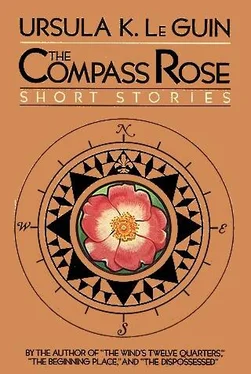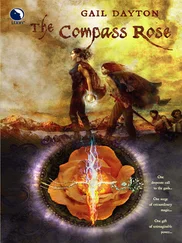Ursula Le Guin - The Compass Rose
Здесь есть возможность читать онлайн «Ursula Le Guin - The Compass Rose» весь текст электронной книги совершенно бесплатно (целиком полную версию без сокращений). В некоторых случаях можно слушать аудио, скачать через торрент в формате fb2 и присутствует краткое содержание. Жанр: Фантастика и фэнтези, на английском языке. Описание произведения, (предисловие) а так же отзывы посетителей доступны на портале библиотеки ЛибКат.
- Название:The Compass Rose
- Автор:
- Жанр:
- Год:неизвестен
- ISBN:нет данных
- Рейтинг книги:3 / 5. Голосов: 1
-
Избранное:Добавить в избранное
- Отзывы:
-
Ваша оценка:
- 60
- 1
- 2
- 3
- 4
- 5
The Compass Rose: краткое содержание, описание и аннотация
Предлагаем к чтению аннотацию, описание, краткое содержание или предисловие (зависит от того, что написал сам автор книги «The Compass Rose»). Если вы не нашли необходимую информацию о книге — напишите в комментариях, мы постараемся отыскать её.
From dream worlds to nightmare planets, through mazes of madness to tiny time holes in space, down Pathways of Desire to a New Atlantis, THE COMPASS ROSE points the way to the wonder-filled mind-country of a remarkable writer.
"As good as any contemporary at creating worlds, imaginary or our own… Le Guin writes with painstaking intelligence. Her characters are complex and haunting, and her writing is remarkable for it's sinewy grace."
—TIME Magazine
The Compass Rose — читать онлайн бесплатно полную книгу (весь текст) целиком
Ниже представлен текст книги, разбитый по страницам. Система сохранения места последней прочитанной страницы, позволяет с удобством читать онлайн бесплатно книгу «The Compass Rose», без необходимости каждый раз заново искать на чём Вы остановились. Поставьте закладку, и сможете в любой момент перейти на страницу, на которой закончили чтение.
Интервал:
Закладка:
The ascent of the Nightingale Was not easy. The way was open at first, and well marked by our support party, but after some days we came among terrible crevasses, a maze of hidden cracks, from a foot to thirty feet wide and from thirty to a thousand feet deep. Step by step we went, and step by step, and the way always upward now. We were fifteen days on and the hot nights without darkness were wretchedly uncomfortable in our small tents. And all of us suffered more or less from snowblindness just at the time when we wanted clear eyesight to pick our way among the ridges and crevasses of the tortured ice, and to see the wonders about and before us. For at every day’s advance more great, nameless peaks came into view in the west and southwest, summit beyond summit, range beyond range, stark rock and snow in the unending noon.
We gave names to these peaks, not very seriously, since we did not expect our discoveries to come to the attention of geographers. Zoe had a gift for naming, and it is thanks to her that certain sketch maps in various suburban South American attics bear such curious features as “Bolivar’s Big Nose,” “I Am General Rosas,” “The Cloudmaker,” “Whose Toe?” and “Throne of Our Lady of the Southern Cross.” And when at last we got up onto the altiplano, the great interior plateau, it was Zoe who called it the pampa, and maintained that we walked there among vast herds of invisible cattle, transparent cattle pastured on the spindrift snow, their gauchos the restless,merciless winds. We were by then all a little crazy with exhaustion and the great altitude—twelve thousand feet—and the cold and the wind blowing and the luminous circles and crosses surrounding the suns, for often there were three or four suns in the sky, up there.
That is not a place where people have any business to be. We should have turned back; but since we had worked so hard to get there, it seemed that we should go on, at least for a while.
A blizzard came with very low temperatures, so we had to stay in the tents, in our sleeping bags, for thirty hours, a rest we all needed; though it was warmth we needed most, and there was no warmth on that terrible plain anywhere at all but in our veins. We huddled close together all that time. The ice we lay on is two miles thick.
It cleared suddenly and became, for the plateau, good weather: twelve below zero and the wind not very strong. We three crawled out of our tent and met the others crawling out of theirs. Carlota told us then that her group wished to turn back. Pepita had been feeling very ill; even after the rest during the blizzard, her temperature would not rise above 94°. Carlota was having trouble breathing. Zoe was perfectly fit, but much preferred staying with her friends and lending them a hand in difficulties to pushing on towards the Pole. So we put the four ounces of pisco which we had been keeping for Christmas into the breakfast cocoa, and dug out our tents, and loaded our sledges, and parted there in the white daylight on the bitter plain.
Our sledge was fairly light by now. We pulled on to the south. Juana calculated our position daily. On the twenty-second of December, 1909, we reached the South Pole. The weather was, as always, very cruel. Nothing of any kind marked the dreary whiteness. We discussed leaving some kind of mark or monument, a snow cairn, a tent pole and flag; but there seemed no particular reason to do so. Anything we could do, anything we were, was insignificant, in that awful place. We put up the tent for shelter for an hour and made a cup of tea, and then struck “90° Camp.” Dolores, standing patient as ever in her sledging harness, looked at the snow; it was so hard frozen that it showed no trace of our footprints coming, and she said, “Which way?”
“North,” said Juana.
It was a joke, because at that particular place there is no other direction. But we did not laugh. Our lips were cracked with frostbite and hurt too much to let us laugh. So we started back, and the wind at our backs pushed us along, and dulled the knife edges of the waves of frozen snow.
All that week the blizzard wind pursued us like a pack of mad dogs. I cannot describe it. I wished we had not gone to the Pole. I think I wish it even now. But I was glad even then that we had left no sign there, for some man longing to be first might come some day, and find it, and know then what a fool he had been, and break his heart.
We talked, when we could talk, of catching up to Carlota’s party, since they might be going slower than we. In fact they had used their tent as a sail to catch the following wind and had got far ahead of us. But in many places they had built snow cairns or left some sign for us; once Zoe had written on the lee side of a ten-foot sastrugi, just as children write on the sand of the beach at Miraflores, “This Way Out!” The wind blowing over the frozen ridge had left the words perfectly distinct.
In the very hour that we began to descend the glacier, the weather turned warmer, and the mad dogs were left to howl forever tethered to the Pole. The distance that had taken us fifteen days going up we covered in only eight days going down. But the good weather that had aided us descending the Nightingale became a curse down on the Barrier ice, where we had looked forward to a kind of royal progress from depot to depot, eating our fill and taking our time for the last three hundred-odd miles. In a tight place on the glacier I lost my goggles—I was swinging from my harness at the time in a crevasse—and then Juana had broken hers when we had to do some rock climbing coming down to the Gateway. After two days in bright sunlight with only one pair of snow goggles to pass amongst us, we were all suffering badly from snowblindness. It became acutely painful to keep lookout for landmarks or depot flags, to take sightings, even to study the compass, which had to be laid down on the snow to steady the needle. At Concolorcorvo Depot, where there was a particularly good supply of food and fuel, we gave up, crawled into our sleeping bags with bandaged eyes, and slowly boiled alive like lobsters in the tent exposed to the relentless sun. The voices of Berta and Zoe were the sweetest sound I ever heard. A little concerned about us, they had skied south to meet us. They led us home to Base.
We recovered quite swiftly, but the altiplano left its mark. When she was very little, Rosita asked if a dog “had bitted Mama’s toes.” I told her Yes, a great, white, mad dog named Blizzard! My Rosita and my Juanito heard many stories when they were little, about that fearful dog and how it howled, and the transparent cattle of the invisible gauchos, and a river of ice eight thousand feet high called Nightingale, and how Cousin Juana drank a cup of tea standing on the bottom of the world under seven suns, and other fairy tales.
We were in for one severe shock when we reached Base at last. Teresa was pregnant. I must admit that my first response to the poor girl’s big belly and sheepish look was anger—rage—fury. That one of us should have concealed anything, and such a thing, from the others! But Teresa had done nothing of the sort. Only those who had concealed from her what she most needed to know were to blame. Brought up by servants, with four years’ schooling in a convent, and married at sixteen, the poor girl was still so ignorant at twenty years of age that she had thought it was “the cold weather” that made her miss her periods. Even this was not entirely stupid, for all of us on the Southern Journey had seen our periods change or stop altogether as we experienced increasing cold, hunger, and fatigue. Teresa’s appetite had begun to draw general attention; and then she had begun, as she said pathetically, “to get fat.” The others were worried at the thought of all the sledge-hauling she had done, but she flourished, and the only problem was her positively insatiable appetite. As well as could be determined from her shy references to her last night on the hacienda with her husband, the baby was due at just about the same time as the Yelcho, the twentieth of February. But we had not been back from the Southern Journey two weeks when, on February 14, she went into labor.
Читать дальшеИнтервал:
Закладка:
Похожие книги на «The Compass Rose»
Представляем Вашему вниманию похожие книги на «The Compass Rose» списком для выбора. Мы отобрали схожую по названию и смыслу литературу в надежде предоставить читателям больше вариантов отыскать новые, интересные, ещё непрочитанные произведения.
Обсуждение, отзывы о книге «The Compass Rose» и просто собственные мнения читателей. Оставьте ваши комментарии, напишите, что Вы думаете о произведении, его смысле или главных героях. Укажите что конкретно понравилось, а что нет, и почему Вы так считаете.




